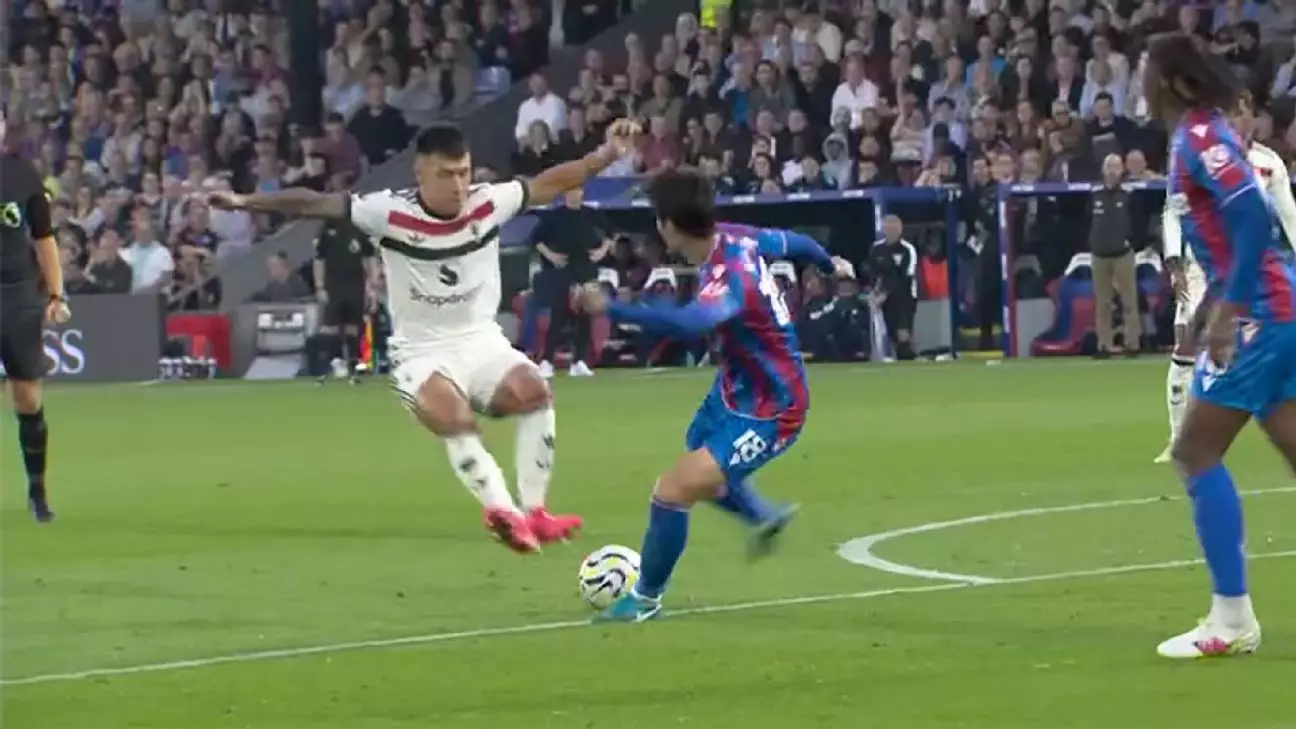The dynamics of the Premier League are often dictated by key match incidents (KMIs) that can alter the course of a game, leading to heated debates and discussions among fans, pundits, and analysts alike. A recent review conducted by the Premier League’s Independent Key Match Incidents Panel has shed light on controversial refereeing decisions that occurred during the league’s fifth match week. These discussions not only highlight the intricacies of refereeing but also the challenges posed by technology in the form of Video Assistant Referee (VAR).
In the match between Manchester United and Crystal Palace that ended in a goalless draw, defender Lisandro Martínez was at the center of controversy following his challenge on Daichi Kamada. Despite his risky jump with both feet, the match referee, David Coote, only issued a yellow card. The VAR, Chris Kavanagh, opted not to call for a review, citing Premier League and UEFA regulations which suggest that if no contact occurs in a challenging situation, only a yellow card is warranted. While the KMI Panel unanimously supported the decision to uphold the yellow card, they expressed concerns over the nature of the challenge itself, labeling it as “ridiculous” and indicative of conduct not befitting the sport. Here, we see a significant conflict between strict adherence to rules and the essence of sportsmanship.
The dilemma revolves around the enforcement of rules and the apparent discretion exercised by referees and VAR officials. As both a protective mechanism for players and a framework for fair play, the regulations should ideally promote an environment where dangerous challenges either result in appropriate sanctions or are eliminated from the game entirely. The KMI Panel’s assertion that Martínez was fortunate not to have made contact with his opponent showcases a conflicting narrative—acknowledging the gravity of the action while conceding a lack of immediate consequence.
The decisions made regarding Arsenal’s Leandro Trossard provide another layer of complexity. Trossard received a second yellow card during a dramatic match against Manchester City, a decision that the KMI Panel supported with a majority. This action highlighted the nuances that referees must navigate, often requiring both swift judgment and an understanding of game dynamics. The panel’s approval suggests a consensus regarding the need for discipline in dealing with time-wasting tactics, which have increasingly become a point of contention in modern football.
Interestingly, while Trossard’s dismissal was upheld, the same panel found substantial disagreement with Nottingham Forest’s Morgan Gibbs-White’s second yellow card. Here, a split vote suggested the challenge didn’t meet the threshold for a dismissal, indicating a lack of uniformity in the application of disciplinary measures across similar situations. This not only reflects the subjective nature of officiating but raises questions about the reliability of officiating standards, calling into question the integrity of the match outcomes.
The panel also discussed contentious VAR decisions surrounding West Ham United and Chelsea, particularly the failure to award a penalty when Wesley Fofana was alleged to have impeded Crysencio Summerville’s progress into the box. The split decision among the KMI members has spotlighted a persistent issue with VAR interventions: determining when an incident truly warrants scrutiny. With a vote that leaned towards the idea that VAR should have intervened, the overall sentiment affirms the tendency for refereeing decisions to be both criticized and overly scrutinized.
Moreover, the KMI Panel’s acknowledgment of instances where errors were not rectified by VAR indicates a larger systemic issue within the league’s officiating structure. So far this season, only one premise has been declared outright incorrect, suggesting improvements in technology implementation. However, the identified errors leave fans questioning how consistent and transparent the criteria for intervention truly are.
As the Premier League continues to navigate the intersection of human judgment and technological intervention, the findings from the Independent Key Match Incidents Panel raise important questions about the future of officiating. The critical discussion surrounding these match incidents offers a glimpse into the challenges that lie ahead. While technology is meant to enhance fairness and accountability, it is essential for all stakeholders in the sport to be engaged in ongoing conversations about integrity, rules, and the fundamental respect for the game.
Ultimately, faithful to its rich tradition and fervent fanbase, the Premier League must strive for both the evolution of its officiating practices and the safeguarding of its players, ensuring that matches are decided fairly and justly. Balancing regulations with the spirit of the game will remain an ongoing battle for the league in the pursuit of sporting excellence.

Leave a Reply